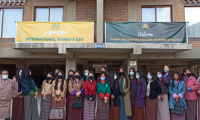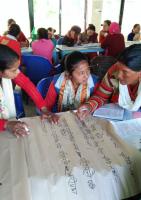Own your social media
Social media is feared by many female politicians for harsh, snide comments and often even sexual harassment. This counts for Bhutan as well as Denmark. But social media can also be a tool to break out of the often male-dominated arena of traditional media and enter politics standing on one’s own feet.

The group of participants at the training in Bhutan 2021. All the women are members of different parties and aspiring to compete in the next election in Bhutan.
From 8 March to 12 March, DIPD and the Socialist People’s Party (SPP) held a training for 25 young aspiring women political candidates in Bhutan together with the local partner, Bhutan Democracy Dialogue (BDD) and the Election Commission of Bhutan (ECB). The training was done by local trainers in the morning sessions and in the afternoon sessions, the training was done virtually by DIPD and SPP.
The reflection on social media was one of the conclusions from a week-long training session for young women politicians aspiring for the next election in Bhutan. The women got together with local trainers and experienced politicians from Denmark.
The first online session brought MP Kathrine Olldag from the Social Liberal Party and MP Rasmus Nordqvist from the Socialist People’s Party to Bhutan via zoom to discuss gender barriers. The debate among the young women and with the Danish politicians discussed gender barriers in Denmark and in Bhutan and focused on how to overcome them. One of the relevant issues in both Bhutan and Denmark is the debate culture and the media coverage of politics. Kathrine Olldag stated that she sees both ‘arenas’ as dominated by what she considers stereotypical male values, such as conflict and opposing opinions. This dominance makes it more difficult for women to find their spot in the public debate that takes place through the traditional media. This is one reason why social media can be a tool to break through the barriers.
Social media is unfortunately also a space that some people use to attack politicians. Both Danish politicians have had challenging and scary experiences because of messages on their different personal platforms:

- I have received many horrible messages on social media, Rasmus Nordqvist shared with the young Bhutanese
- But I have been very surprised not just by how many but also how mean the messages that my female colleagues receive are. Therefore, it is very important to have some tools for breaking through on social media.
- Embrace social media platforms as your own. Try never to lose sight of yourself in your communication no matter what the mainstream way of gaining attention might be, Kathrine Olldag advised the young women.

- Social media should be used as a place of expressing oneself and being yourself, Kathrine Olldag stressed continuing,
- See it in a positive way as a way of presenting yourself as you are. Kathrine Olldag stated that this approach has given her many votes and has been a way of finding an open spot in the debate.
How to own your social media:
- Express yourself without compromising.
- Know that you can influence the debate culture by using your voice.
Watch the video with the inputs from Danish PM's
Having role models, being role models
The young women have entered politics to be a voice for the youth and women in Bhutan. It can be tough to break into a debate culture where men have the loudest voice. Luckily, some women are taking a stance. They break into male dominated arenas and become role models for young women aspiring to do the same.

When asked about their role models, several of the participants mentioned the first female minister in Bhutan, Aum Dorji Choden. They also mentioned another woman who has broken into a male dominated area, the first female taxi-driver in Bhutan, Tshering Lhamo. She overcame the stereotypes of what it entails to be a taxi-driver and got her licence. Even though she was mocked by her colleagues she powered through and kept on driving.
Both Kathrine Olldag and Rasmus Nordqvist mentioned Danish politicians as their role models. Kathrine Olldag talked about how she still becomes a bit star struck when meeting Margrethe Vestager, the Danish Executive Vice-President to the European Commission. Kathrine is impressed with Margrethe Vestager’s ability to fight the big tech companies while maintaining her personal style and powering through politically.
The aim of the training was to strengthen the self-confidence of the young Bhutanese. To support the ambitions of the young women who want to dare to take the chance and make change. Ultimately, to become role models of the future. Moreover, during the training, SPP and DIPD also provided Danish perspectives of how gender barriers in politics are understood and challenged in our part of the world.
The training session consisted of:
- Debate on political between MPs Kathrine Olldag and Rasmus Nordqvist on overcoming gender barriers
- Talks about gender barriers globally with participation Rachana Khadka, Member of Bagmati Provincial Assembly and Central Committee Member of Nepal Communist Party (NCP) and
Anika Jane Dorothy, Executive Director of the Green Congress of Kenya
- Presentation by gender specialist Emma Holten analysing gender barriers in Bhutan
- Communication workshops carried out by the SPP campaign team. The focus of the workshops was drawing on experiences from Danish politicians and putting this into a Bhutanese context.
In the closing session, many of the participants expressed that the training provided new tools that they would use in the coming election. Many also felt that they had built a stronger confidence.
Despite the challenging setup of having to facilitate half of the training on Zoom. BDD and ECB were very satisfied with the training and have requested DIPD and SPP make a new, joint training session for the group of aspiring women candidates.

Ensuring a culture of democracy and more women in politics in Bhutan
DIPD partners with the Green Left and local partners in Bhutan on strengthening democracy and Women’s Participation and Representation in Governance, Leadership and Politics in Bhutan.




